Neurodegenerative disorders like dementia and Alzheimer’s actively cause damage or decay of brain cells. Evidence suggests that microdoses of THC could slow or reverse brain aging, and improve cognitive abilities.
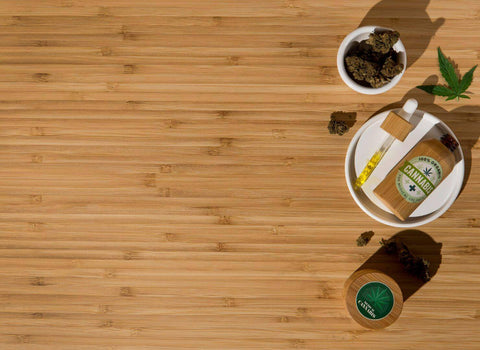
According to a 2017 study on mice, low doses of THC can aid brain function, restoring learning and memory levels. In the study, low doses of delta-9-tetrahydrocannabinol (Delta 9 THC) helped reverse cognitive decline in mice aged 12 to 18 months.
Why Microdosing THC is Best for the Brain
When it comes to affecting the brain, THC appears to have a negative effect at high doses, and a positive effect at low doses.
Excessive doses of THC can potentially impair brain functions—memory, learning, and impulse control—especially in adolescents and young adults.
Since microdosing THC comes with no adverse effects, it may be a potential treatment for mitigating symptoms of neurodegenerative diseases. Many people microdose cannabis for medical purposes because of its anti-inflammatory, anti-oxidant, and analgesic properties. Study suggests microdosing THC can help dementia and Alzheimer’s disease, as well as depression, anxiety, and other conditions.
Are you thinking about trying to microdose cannabis for Alzheimer’s? Our THC gummies might just be the perfect way to start! They contain 0.3% hemp-derived THC by dry weight, which means that our Delta 9 THC gummies are federally legal, safe, and plain awesome.
Read more about the benefits of microdosing cannabis.
Can THC Reverse Brain Aging?
In 1998, a research article on the neuroprotective effects of cannabis prompted researchers to look into the role of THC and CBD in neurodegenerative diseases more closely.
Recent studies suggest that cannabis could have a positive impact on diseases that affect memory, like Alzheimer’s and Huntington’s. Researchers found that low doses of THC slow or even prevent the advance of these neurodegenerative diseases, mainly by promoting the creation of neurons.
A 2018 study suggests that THC improves neurological function “when administered chronically at low concentrations.” Low doses of THC also seem to:
- Promote neurogenesis
- Prevent neurodegenerative processes in animals suffering from Alzheimer’s disease
- Treat cognitive impairments caused by inflammation
- Restore memory and cognitive function
Neurogenesis and Brain Aging
Neurogenesis is the process by which new neurons are formed in the brain. It was only recently discovered that we can actually grow new brain cells, even in our old age, through the process of neurogenesis. In the last thirty years, many studies have attempted to discover the neurogenesis mechanism in the adult human brain.
If new neurons aren’t put to use, they are likely to die off. That’s why it’s important to engage them in activities that require concentration. Learning a new skill, learning a new language, or taking on intellectual challenges can all stimulate neurogenesis.
In old age, the process of neurogenesis usually declines. According to research, reduced neurogenesis is directly responsible for age-related cognitive decline.
THC and Dementia
According to a recent study, microdosing THC could reverse the aging process in the brain. Scientists at the University of Bonn and their colleagues at the Hebrew University of Jerusalem, found that low doses of cannabis can also potentially treat dementia. The study was based on mice models, but the researchers want to investigate whether THC could reverse brain aging in humans, as well.
Other studies offer encouraging results on the effects of medical cannabis on Alzheimer’s disease and dementia. A study published in Nature Medicine suggests that low doses of Delta 9 THC restores cognitive function and aids symptoms of dementia.
Dementia involves a range of neurological disorders that affect normal brain functioning. Many types of dementia—such as vascular dementia and frontotemporal dementia—are caused by damage or degeneration of brain cells, leading to a decline in cognitive functions.
Onset dementia is characterized by the following symptoms:
- Memory loss and confusion
- Difficulty speaking, understanding, and expressing thoughts
- Paranoia or delusions
- Impulsiveness, irritability, and violent behavior
What Does THC Do to the Brain?
Tetrahydrocannabinol (THC) is one of the two major cannabinoids found in the cannabis plant. It has psychoactive effects and at higher doses it can cause tachycardia, euphoria, sedation, and paranoia.
However, people who microdose cannabis experience no adverse effects. Low doses of THC have many purported benefits without the intense psychotropic properties that are usually associated with smoking weed.
THC microdosing is believed to reduce inflammation, reduce pain, promote sleep, help with anxiety, and improve mental health generally. For example, folks who microdose THC for depression report significant reduction in depressive episodes and symptoms.
But how does THC do all that?
The Endocannabinoid System
THC binds directly to CB1 and CB2 cannabinoid receptors in the body’s endocannabinoid system. The ECS is a network of signals and receptors in our brain that regulate a range of important bodily functions: pain perception, immune system, sleep, appetite, and memory.
The other major cannabinoid, cannabidiol (CBD), also interacts with the endocannabinoid system, albeit more indirectly. Because of CBD’s anticonvulsant and anxiolytic properties, it appears to help reduce epileptic seizures, soothes neuropathic pains, and mitigates anxiety symptoms.
Unlike THC, CBD does not make you high, as it has no psychoactive effects. Many people microdose cannabidiol to alleviate chronic pain, reduce stress, and improve sleep quality. CBD is also great for reducing inflammation.
A recent review of the effects of low-dose cannabis found that CBD could potentially suppress the main causal factors of Alzheimer’s disease by activating protective anti-neuroinflammatory receptors. Cannabis consumption at smaller doses seems to regulate synaptic transmissions and promote neuroprotection in the endocannabinoid system.
Another review on the effects of medical marijuana on Alzheimer’s disease shows that cannabidiol extracts might be helpful in treatment and prevention of Alzheimer’s. CBD and THC together appear to produce more effective results than either cannabinoid in isolation.
In 2021, researchers looked into the efficacy of Delta 9 THC combined with CBD in a 1:1 ratio as a potential treatment for reversing spatial learning deficits. According to the research, chronic low doses of THC improved cognitive performance in elderly mice.
One of the lead researchers, Andreas Zimmer, investigated how the cognitive decline was influenced by the endocannabinoid system. It appears that signaling functions of CB1 receptors diminish with age in specific brain regions that regulate learning and memory. This directly influenced the cognitive aging in mice in the research.
One way to reap the benefits of THC and CBD working together is with our full spectrum gummies. They contain 0.3% of hemp-derived Delta 9 THC on a dry weight basis, making them federally legal. And they have both CBD and THC for the all-important entourage effect.
The Entourage Effect
Although THC and CBD each have potent therapeutic effects in isolation, it is the combination of the two cannabinoids that seems to maximize neurogenesis. When CBD and THC work together, they produce what is known as the entourage effect.
The entourage effect is a theory propounding that CBD and THC create a synergy in which the benefits of each cannabinoid is enhanced by the presence of the other. The entourage effect includes not only THC and CBD but other cannabinoids, as well—CBN, CBC, CBG, Delta 8, Delta 10, etc.
The best way to enjoy the beneficial effects of cannabis synergy is with our THC gummies. They contain Delta 9 THC, cannabidiol, CBN, and other cannabinoids for the optimal entourage effect.
Our CBD products include broad spectrum and full spectrum CBD. Broad spectrum CBD gummies do not contain THC but can have other cannabinoids. Full spectrum CBD products contain all cannabis compounds, including THC, for the ultimate entourage effect.
For more on the differences between the two, read our guide to broad vs full spectrum CBD.
Whether you’re looking to boost energy, reverse brain decline, or fall asleep without a fuss, these are your ideal wellness edibles. All our full spectrum CBD gummies are 100% vegan and hemp-derived, made with the finest ingredients and tested in a third-party lab to ensure quality and safety.
CBD and THC differ in their chemical composition and in their effects on our brain. Read our guide to the differences between THC and CBD.
The Effects of CBD on Neurogenesis
Recent cannabis research seems to imply that CBD has a capacity to increase neurogenesis by replacing the cells that were lost or regenerating damaged brain cells. CBD and THC can prevent neuronal death due to their neurogenetic and neuro repairing properties.
Low CBD Dosage Good for Neurogenesis
Low-dose CBD seems to reduce anxious behaviors and increase cell proliferation and neurogenesis. High doses of CBD, in contrast, decrease cell proliferation. High doses also appear to increase anxious behaviors and depression. Research reveals that repeated high doses of CBD dampen neurogenesis, with the end result being a decreased number of brain cells.
CBD Slows Cognitive Decline and Increases Serotonin
A 2016 study found that CBD reduces age-related cognitive decline, as well as neuroinflammation caused by strokes in mice. Smaller doses of CBD seem to increase neurogenesis and neuroplasticity—our brain’s ability to change and reorganize and to produce new brain cells.
Some animal studies show CBD increases levels of serotonin and glutamate in depressed rats. Our brain’s prefrontal cortex relies heavily on serotonin and glutamate to control mood, but also to regulate memory and learning processes.
If you’re struggling with racing thoughts and can’t find a way to relax, try our Relax CBD Gummies. They contain 100% natural, hemp-derived cannabidiol (25mg) and an additional 100 mg of ashwagandha. Oh, and they taste like the freshest watermelon on a hot summer day. Need we say more?
CBD for Neurological Disorders in Dogs
Cannabidiol appears to alleviate seizures and neuropathy in dogs. Just like in humans, CBD helps maintain homeostasis—the body’s healthy balance—in dogs. According to a study, an imbalanced canine ECS may lead to poor appetite, sleep issues, anxiety, fear and aggression, and chronic pain.
CBD targets the ECS of dogs to relieve pain, promote sleep, and treat other symptoms of neurological disorders like degenerative myelopathy.
Is CBD Legal?
CBD is federally legal under the conditions of the 2018 Farm Bill, meaning it must be derived from hemp. Since the Bill excludes hemp from the legal definition of marijuana, marijuana-derived CBD is illegal.
All nama CBD products are legal on a federal level, as they contain Farm Bill compliant Delta 9 THC that is federally legal in the US.
Is THC Legal?
Delta 9 THC is federally legal in the US if compliant with the 2018 Farm Bill. For a product to be compliant with the Farm Bill, the THC in the product must be derived from hemp—not marijuana—and it must contain no more than 0.3% of THC by dry weight.
Not sure how hemp is different from marijuana? Take a look at our guide to the difference between marijuana and hemp.
Also make sure to read our state-by-state guide on the legality of Delta 9 THC.
Product QUIZ
Need help deciding what product is best for you? Take our quiz, just three questions until your perfect match!
Can CBN Help Reverse Brain Aging?
Cannabinol (CBN), another member of the cannabis family, interacts with the endocannabinoid system to produce a plethora of beneficial effects. Similarly to CBD, CBN does not have any psychoactive effects.
A research program conducted at Salk University for Biological Studies revealed CBN’s neuroprotective role. It seems that CBN protects brain cells from neurodegenerative processes when mitochondria become dysfunctional or inefficient. CBN reinforces mitochondria and preserves mitochondrial function.
Our CBN gummies are a perfect choice to reduce inflammation and bring relaxation. They are infused with high-quality CBN and hemp-derived CBD, and together these potent cannabinoids create the ultimate pain-relieving entourage effect.
If you’re suffering from insomnia, add our CBD gummies for sleep to your bedtime routine. They contain not only a balanced ratio of CBD to CBN but also a kick of melatonin to induce sleep and relaxation in a natural, safe way.
To learn more about benefits of CBN, read our guide on the differences between CBN and CBD.
Delta 8 THC in Neurodegenerative Diseases
A recent study suggests that delta-8-tetrahydrocannabinol (Delta 8 THC) increases the levels of acetylcholine in the brain. Acetylcholine is a neurotransmitter that helps sustain memory and learning and is involved in maintaining a healthy mental disposition.
Delta 8 THC seems to help improve behavioral problems associated with Alzheimer’s and other types of dementia. In a study on cannabis and Alzheimer’s disease, Delta 8 appears to have strong therapeutic potential in treating neuronal inflammation and degeneration of brain cells caused by Alzheimer’s.
Similarly to other cannabinoids, it binds to cannabinoid receptors in our endocannabinoid system. The main difference between Delta 8 and Delta 9 THC is that Delta 8 produces milder euphoric effects and is unlikely to get you high. Cannabis users experience improvements in appetite, mood, and nausea after microdosing Delta 8.
If you’re interested in experiencing the beneficial effects of Delta 8, our Elevate Gummies are the perfect choice. Each flavorful gummy contains 12.5 mg of Delta 8 THC derived from the top quality hemp plant.
Because they are compliant with the 2018 Farm Bill, all nama CBD’s Delta 8 products are federally legal—they are derived from the hemp plant and contain no more than 0.3% of THC by dry weight.
Despite federal legality, fourteen US states still ban Delta 8 products outright:
- Alakasa
- Arkansas
- Arizona
- Colorado
- Delaware
- Iowa
- Idaho
- Kentucky
- Montana
- Mississippi
- New York
- Rhode Island
- Vermont
- Utah
FAQ on Microdosing THC to Reverse Brain Aging
Does THC Increase Dopamine?
A recent study suggests that Delta 9 THC enhances the dopamine-release process in our brain, thus increasing the levels of the happy hormone. When dopamine is increased, you might feel the euphoric, psychoactive properties of THC that we usually call a high.
A different study explores the way CBD influences dopamine levels in the brain. Dopamine is also linked to memory and awareness, but more importantly, to focus. When lacking dopamine, our attention suffers. Microdosing edibles helps with ADHD.
Does THC Release Serotonin?
THC not only helps release dopamine, but also serotonin, the feel-good hormone. In 2007, researchers observed antidepressant effects of cannabinoids in laboratory animals. It seems that THC increased activity in the neurons that produce serotonin.
It was also noted that low doses of THC had significant antidepressant effects, whereas higher doses had dampening effects on serotonin production.
Is cannabis FDA approved?
To date, the FDA has not approved cannabis for medical purposes.
However, the Food and Drug Administration has approved four different drugs based on cannabinoids: Nabilone and Dronabinol contain synthetic cannabinoids. Epidiolex is based on plant-extracted CBD, used to treat seizures associated with severe forms of epilepsy. Sativex is composed of THC and CBD in 1:1 ratios. It is commonly used in treating symptoms of MS.
Is Delta 8 synthetic?
Delta 8 can be either natural or synthetic. Natural Delta 8 is extracted from cannabis plants. Since not a lot of Delta 8 is present in cannabis and hemp, the cannabis industry relies on making Delta 8 synthetically from CBD.
Can microdosing cause dementia?
There is no evidence that microdosing THC can cause dementia.
Dementia researchers say that an excessive dose of THC affects the brain negatively, causing potential cognitive impairments and deterioration of symptoms of dementia. Low doses of THC and CBD are successfully used as a treatment for dementia, improving symptoms and potentially reversing brain aging.
Microdosing is a perfectly safe way to take advantage of all the beneficial effects of cannabinoids without the concern about ruining your health. Sleep Plus Gummies are an ideal start to your microdosing routine. They produce the blissful entourage effect, combining 2 mg of THC with 25 mg of CBD to relieve pain, reduce stress, and help you sleep.
Does CBD help with sundowning?
Sundowning refers to a common symptom of confusion in patients suffering from Alzheimer’s and dementia that often lasts during the night. Patients report restlessness, irritability, and night agitation, making it difficult to maintain normal sleep patterns.
CBD might be a highly effective treatment for symptoms of Alzheimer’s, particularly sundowning. CBD helps sundowners by enhancing the health of brain cells. Due to its anti-inflammatory properties, cannabidiol also promotes a healthy endocannabinoid system that helps improve the body’s natural defenses against degenerative diseases caused by brain aging.
Does CBD cause memory loss?
CBD is believed to help improve cognitive and memory function and prevent memory loss.
Cannabidiol is considered to be neuroprotective: it helps protect neurons responsible for maintaining cognitive function from damage or degeneration. This seems to play a vital part in supporting patients with memory and cognitive impairment.
nama CBD FDA & Legal Disclaimer
Our products are not intended to diagnose, treat, cure, or prevent any disease. They are not a replacement for prescription medications and have not been evaluated by the Food and Drug Administration (FDA).
The information provided on this website does not, and is not intended to, constitute legal advice or any statements of the status of any laws. Any information, content, and materials available on this site are for general informational purposes only, and are not intended to be relied upon for any purpose.
Readers of this website should contact their attorney to obtain advice with respect to any particular legal matter including decisions on what products are, or are not, legal to sell, possess, or consume. No reader, user, or browser of this site should act or refrain from acting on the basis of information on this site without first seeking legal advice from their own counsel in the relevant jurisdiction.
Only your individual attorney can provide assurances that the information contained herein – and your interpretation of it – is applicable or accurate for your particular situation. Use of, and access to, this website or any of the links or resources contained within the site do not create an attorney-client relationship between the reader, user, or browser, and website authors, contributors, contributing law firms, or committee members and their respective employers.
More From the nama Family
Small batch edibles crafted for different times of the day and experiences.
More articles
About
Learn
Join us on this journey

© Copyright 2025 nama Products LLC. All Rights Reserved.
†These statements have not been evaluated by the Food and Drug Administration. These products are not intended to diagnose, treat, cure or prevent any disease. All information presented here is not meant as a substitute for or alternative to information from health care practitioners. Please consult your health care professional about potential interactions or other possible complications before using any product.
††The information provided on this website does not, and is not intended to, constitute legal advice or any statements of the status of any laws. Any information, content, and materials available on this site are for general entertainment purposes only, and are not intended to be relied upon for any purpose.
123 John Doe Street
Your Town, YT 12345
Store Hours
Sun: Closed
Mon-Fri: 9:00 - 17:00
Sat: 10:00 - 13:00
What to expect at pickup
Closed
Closing at 5pm
Closing at 5pm
Closing at 5pm
Closing at 5pm
Closing at 5pm
Closing at 1pm





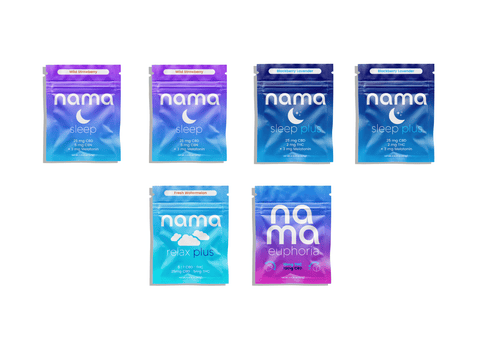
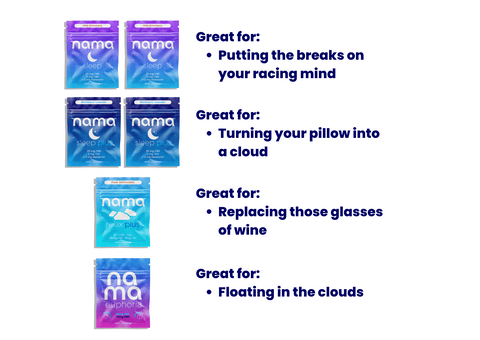
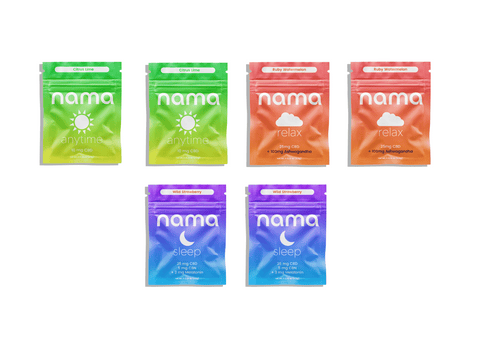
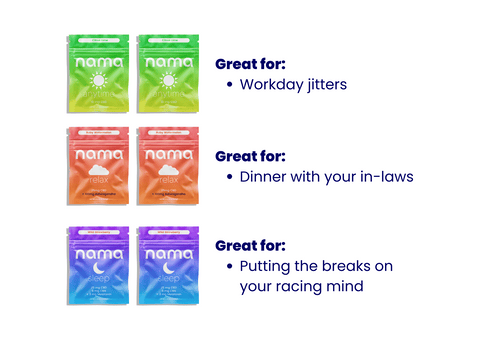
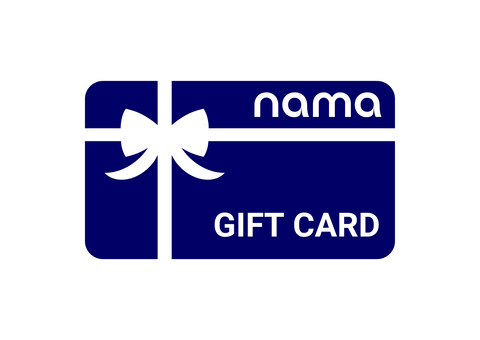







![Buzz Packs™ [THC and CBD Powder Drink Mix]](http://www.namacbd.com/cdn/shop/files/nama_buzz_packs_thc_drink_pack_white_background.png?v=1741884660&width=480)
![Buzz Packs™ [THC and CBD Powder Drink Mix]](http://www.namacbd.com/cdn/shop/files/Buzz_Packs_Label.png?v=1741884660&width=480)


![Buzz Drops™ [THC Drink Drops]](http://www.namacbd.com/cdn/shop/files/nama_thc_buzz_drops.png?v=1711412866&width=480)
![Buzz Drops™ [THC Drink Drops]](http://www.namacbd.com/cdn/shop/files/buzz-drop-wine-comparison.png?v=1736882023&width=480)





Comments (0)
There are no comments for this article. Be the first one to leave a message!